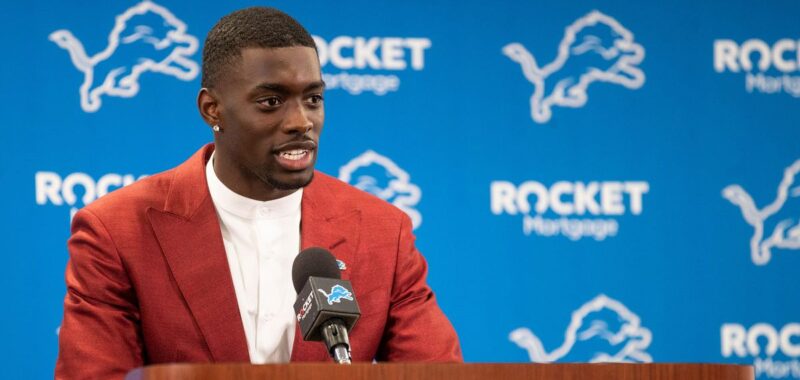When general manager Brad Holmes and coach Dan Campbell took over the Detroit Lions in 2021, they knew they had a big task ahead of them to turn the franchise into a winner. Three years later, they were 30 minutes of football away from the Super Bowl and have exceeded expectations—even if they’re reluctant to take the credit.
“I remember when we first got here, everybody was wondering kind of how long this was going to take, how long is this build going to be,” Holmes reflected after the 2023 season. “And I remember I used the word ‘retool’ and I got killed because I probably should’ve used the word rebuild. […] I never wanted to put a timestamp on it—or an anchor—a time anchor on it because I said, ‘Look, we’re just going to do our job, roll our sleeves up, and work to improve every single day.’ And that’s what we did. So, it’s hard for me to say, ‘Yeah, we are ahead of schedule.’ Because I don’t know what that original timestamp should’ve been in the first place. But I do know we love where we are at and I believe we are at where exactly where we’re supposed to be.”
A big key to their success in 2023 was the return of a top-five offense, paired with an elite run defense, which kept them in position to win games in ways that had previously eluded their reach. But as impressive as their defensive growth was, they still had glaring weaknesses in their secondary, and teams routinely took advantage.
With overhauling the secondary at the forefront of Detroit’s agenda this offseason, Holmes attacked the problem in a variety of ways during the 2024 offseason.
The first step in upgrading the Lions’ secondary began by moving on from both starting outside corners, releasing Cam Sutton after a domestic battery by strangulation arrest and allowing Jerry Jacobs to depart after his contract expired. They also allowed C.J. Gardner-Johnson and Tracy Walker—both briefly held starting jobs in 2023—to exit Detroit this offseason.
To replace their corners, Holmes traded for veteran Carlton Davis and signed veteran Amik Robertson in free agency. In the NFL Draft. The Lions used their first and second-round picks on cornerbacks, trading up and selecting Terrion Arnold with pick No. 24, then snagging Ennis Rakestraw with pick No. 61 overall. They also re-signed Emmanuel Moseley to a one-year deal, hoping he could return to the starter competition after tearing his ACL for the second consecutive season. The Lions are counting on their new additions to create a five-way competition for starting jobs that will result in a higher level of play on the outside.
Brian Branch returns as the Lions’ primary option in the slot, while Kerby Joseph and Ifeatu Melifonwu maintain their starting safety roles. The Lions did little to replace Gardner-Johnson and Walker, only re-signing special teams ace C.J. Moore (after he served his year-long suspension for gambling), but are planning on expanding Branch’s role to include more reps at safety.
“We have so many options right now, so much competitiveness,” Campbell said during minicamp. “[Lions defensive coordinator Aaron Glenn] AG and I were talking about it again, and Brad and I talk about it every evening: the talent level, the competitiveness, the versatility. Honestly, we have no idea who our starting lineups are going to be right now and it’s exciting.”
As exciting as it may be for Campbell to have new players to work with, in order for the Lions to have success, they’ll need several things to happen through training camp and the preseason. Newly-acquired veterans will need to adjust to the Lions’ scheme, rookies will need to adapt to the talent level of the NFL, injured players will need to prove they’re healthy, and returning players need to expand their roles while maintaining or exceeding their level of play. Additionally, with the number of new players competing for starting jobs, and because communication is paramount in the Lions’ split-zone scheme, establishing a report quickly will be vital to early season success.
In the first two weeks of the season, the Lions face the Los Angeles Rams and Tampa Bay Buccaneers, two teams they faced in the playoffs last season that will be difficult early tests. If the Lions’ secondary is not on point from the jump, both offenses have shown that they have the potential to score points in Ford Field. If the Lions hope to match or exceed their 12-5 record from last season, the opening two games will be critical to that process.
On paper, the Lions’ offseason aggression looks to be an upgrade to the secondary but how fast this unit gels will go a long way in determining if the Lions can take the next step in 2024, or if the defense as a whole will regress.

